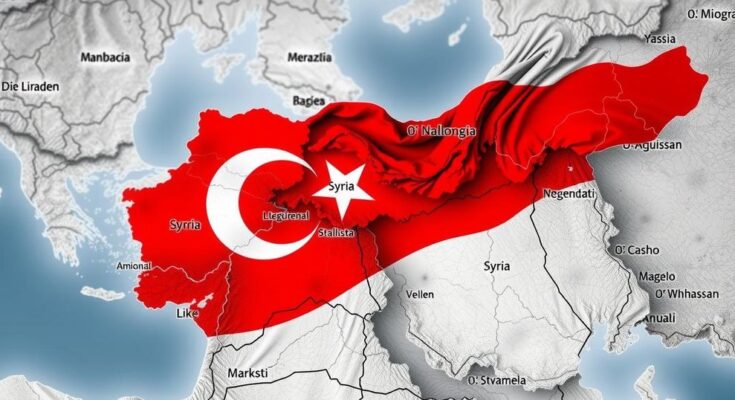The article critiques the narrative celebrating Turkey as the victor in Syria following Assad’s fall. It emphasizes that while Turkey has gained some advantages, significant challenges remain for Erdoğan, including HTS’s autonomy, increased Arab influence, and issues regarding Kurdish nationalism.
The narrative of Turkey’s triumph in Syria, following the recent changes in the region, is premature and overlooks the complexities of the situation. While Turkey has indeed gained advantages due to its relationships with groups like Hayat Tahrir al-Sham (HTS) and the Syrian National Army, the notion that it has emerged victorious is unfounded. President Erdoğan faces significant challenges that complicate his ambitions of becoming the primary power broker in a post-Assad Syria.
Turkey’s involvement arose from its strategic interests in Aleppo, where the fall of the city facilitated a perceived shift in power. However, Turkey’s role was initially aimed at pressuring negotiations rather than outright overthrowing President Assad. Additionally, HTS’s growing autonomy blurs the lines of Turkish influence, particularly following visits from other nations’ diplomats, which suggest that HTS may now pursue more independent foreign relationships.
The assertion that Turkey dominated the landscape misses the fact that major Arab states are actively engaging with the newly emerging leaders in Syria, positioning themselves for influence that Turkey lacks. Erdoğan’s claims of cultural affinity with Arab nations do not translate into real political leverage but highlight Ankara’s diminishing influence. Furthermore, ongoing issues related to Kurdish nationalism complicate Turkey’s strategic objective of countering the Kurdish presence in Syria, particularly regarding the People’s Protection Units (YPG).
In conclusion, while Turkey has potential leverage in Syria post-Assad, its claims of victory are overstated and ignore the intricate dynamics of regional politics. The complexities of Turkey’s interactions with HTS, the ambitions of other regional players, and the challenges posed by Kurdish forces indicate that the narrative of Turkey’s supremacy in Syria remains unsubstantiated.
The article discusses Turkey’s positioning in Syria following the fall of President Bashar al-Assad’s regime. It raises skepticism about the widespread narrative that declares Turkey as the triumphant force in the region. The dynamics of Syrian politics, the complicated partnerships Turkey maintains with various militia groups, and the implications of Kurdish nationalism are explored to provide a deeper understanding of Turkey’s current situation and its future prospects in Syria.
In summary, the belief that Turkey has unequivocally emerged victorious in Syria is challenged by the realities of the political landscape. Major regional powers are repositioning themselves, and Turkey’s historical miscalculations add to its vulnerabilities. The evolving dynamics necessitate a careful reevaluation of Turkey’s role and influence in the post-Assad era, suggesting that the journey ahead will not be as straightforward as some narratives have claimed.
Original Source: foreignpolicy.com




